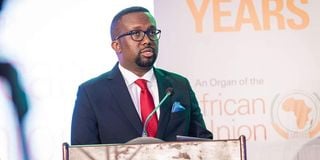Journalists in Africa urged to press on despite administrative setbacks

Omar Faruk Osman, president of the Federation of African Journalists, addresses the audience during the African Union Economic, Social and Cultural Council Forum on Democracy and Institutional Resilience in Accra, Ghana.
Despite the well-documented challenges they face in the line of duty, journalists in Africa have been urged not only to defend freedom of expression but also to work to inform and educate the masses to improve their welfare.
Omar Faruk Osman, president of the Federation of African Journalists, has also urged civil society not to be intimidated by threats and to work to keep the authorities in check.
Mr Osman made the remarks during his recent address at the African Union Economic, Social and Cultural Council Forum on Democracy and Institutional Resilience in Accra, Ghana.
“Democracy thrives when our institutions are strong, independent and resilient. Independence is vital, and journalists must be independent, the media must be independent and civil society must be independent. These pillars of democracy ensure that our voices are heard and that power is held accountable,” he explained.
Free media
“Democracy and journalism are inseparable. Without free and safe media, democracy cannot thrive. Across Africa, journalists face threats, violence, censorship and even killings, reflecting a broader attack on democratic freedoms. This troubling trend underscores the need to safeguard the safety and independence of journalists, who play a critical role in informing the public and highlighting pressing issues.”
He also urged policymakers not to harass journalists and civil society in the event of a disagreement.
“Policymakers should not only engage civil society when they agree with their views. This approach hinders progress and does not help us realise the Africa we want. It is essential to engage consistently and meaningfully as partners in progress, with the government of the day being listening,” he added.
The comments come on a week when journalists in Kenya have had to undergo various challenges in the line of duty, including injuries and abduction.
These include Wanjeri Kariuki, a TV journalist attached to Mediamax Limited who was shot at while covering anti-government protests protests in Nakuru, some 160km from Kenya’s capital Nairobi.
Ms Kariuki says she has reason to believe she was a ‘target’ of the authorities, who say they are investigating the incident in which she had to undergo operation after being shot in the thigh.
“Something did not seem right when we tried to be friendly with the police, some of them had requested toothpaste which I always applied on my cheeks to curb the effects of teargas,” she told the local media.
In another incident that happened hours earlier, veteran journalist Macharia Gaitho was trailed and abducted by policemen inside a police station in Nairobi.
Police later apologised for the incident, claiming they had picked on the wrong man.
Added Osman: “Journalists play a crucial role in nurturing, deepening, and defending democracy and African resilience. We must unite collectively to address democracy deficits and ensure peace and equality. Journalists will play their part in this endeavour and so must we all. By working together, we can address these challenges and build a future where democracy flourishes on our continent.”





